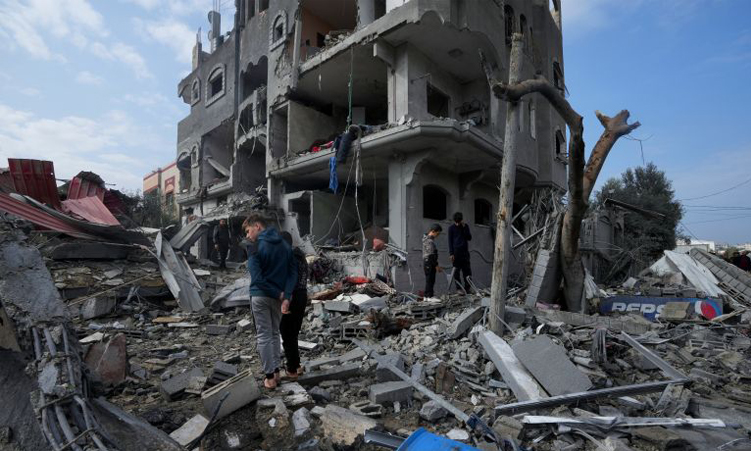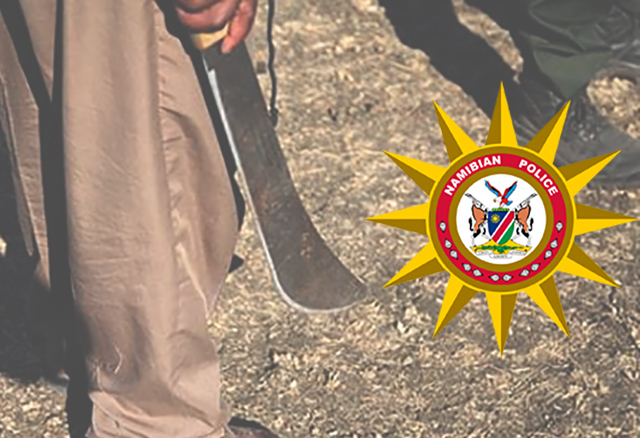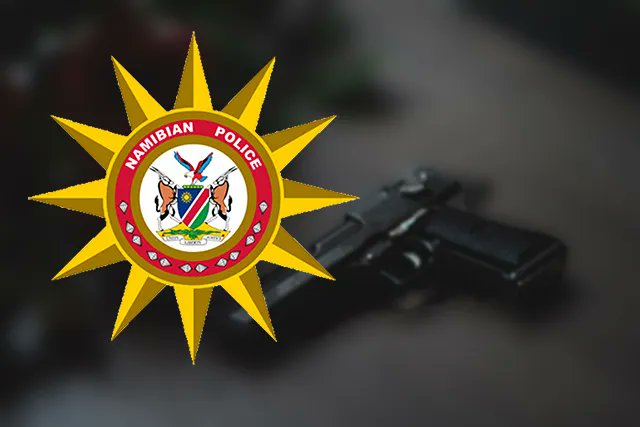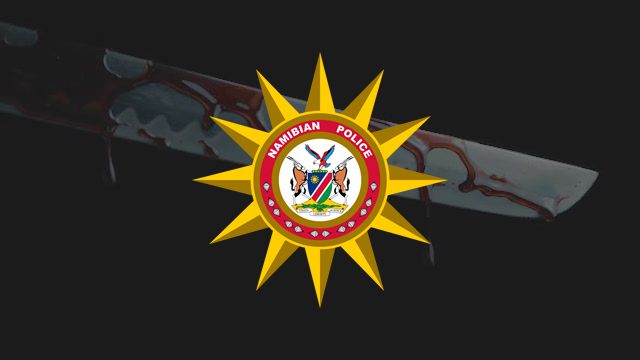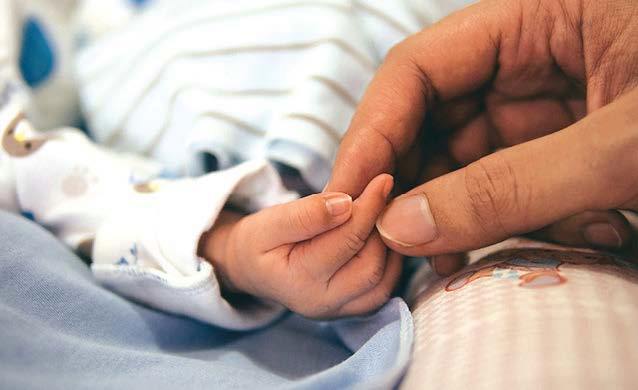On Friday, the International Court of Justice (ICJ) will announce its decision on emergency or provisional measures against Israel in an interim verdict after South Africa filed a case against Israel accusing it of committing genocide in Gaza.
Here is what we know about the possible rulings that the ICJ could deliver, and what they might mean for Israel, Palestine, and their respective allies.
What is South Africa’s case against Israel?
On December 29, South Africa filed an 84-page legal case at the ICJ accusing Israel of violating the 1984 Genocide Convention during its near-four-month bombardment of Gaza.
Israel has dismissed the genocide allegations as “grossly distorted” and deemed them “blood libel”, saying it was acting in self-defence and targeting Hamas, not Palestinian civilians.
On January 11 and 12, the ICJ conducted hearings during which South Africa presented its case and, then, Israel defended itself.
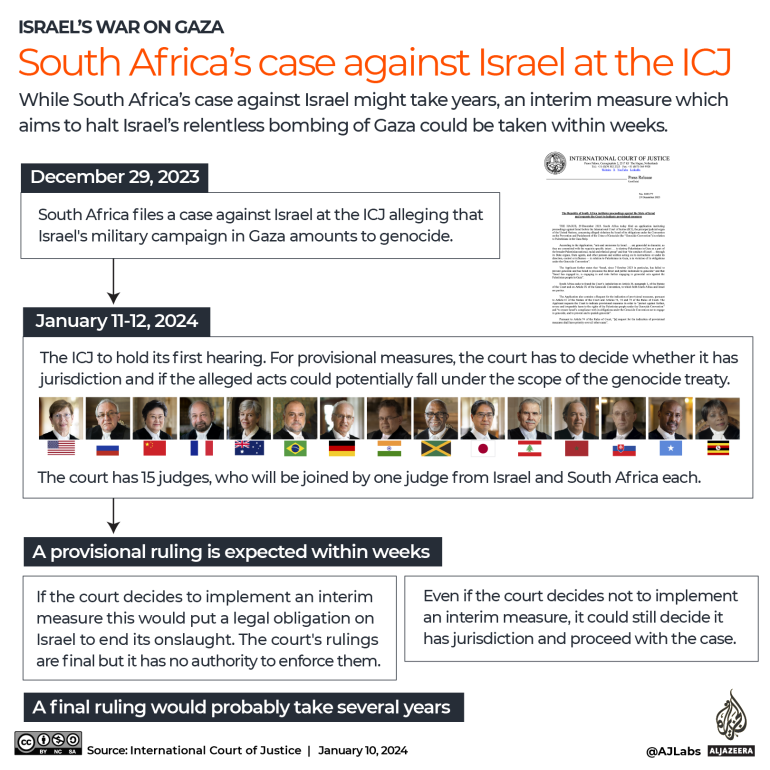
Will the court determine whether Israel is committing genocide?
The ICJ will not deal with the core question of whether Israel is committing genocideon Friday. For now, it will only announce, at 1pm local time (12:00 GMT) whether it can order provisional or emergency measures in Gaza and what those measures will be, while it deliberates the case for genocide.
Experts have said a ruling on the overall case, which will determine whether or not Israel is committing genocide, could take as long as three or four years.
Here are the possible scenarios for what the court could announce on Friday:
Could the court throw out the case?
Israel argued in its response to South Africa’s ICJ allegations that the global court does not have jurisdiction over the case.
It argued that South Africa had not communicated with Israel adequately about the case before filing the application to the court, as is required by the court’s own rules.
The Israeli representative claimed South Africa had given it only a few days to respond to a notification that it was committing genocide. He said that Tel Aviv had been open to the idea of a dialogue, but that South Africa had first rejected a written request due to a holiday, and then had replied that there was “no point” in having a discussion.
The ICJ’s rules require the petitioning nation to show that a dispute exists with the country it is accusing, and that they have tried to address it before approaching the court.
If the ICJ announces Friday that it does not have jurisdiction in the case, the specific requests made by South Africa become immaterial.
What emergency measures has South Africa requested?
When it filed the case, South Africa asked the ICJ to order a series of provisional measures to cease violence in Gaza until the court makes its ruling on the case – a process which experts say may take years.
Some of South Africa’s demands are that:
- Israel suspend military operations in and against Gaza.
- Israel’s military organisations not escalate military operations any further.
- Israel allow access to adequate food, water, fuel, shelter, hygiene and sanitation.
- Israel prevent the destruction of Palestinian life in Gaza.
- Israel not destroy evidence relevant to South Africa’s genocide allegations against it, nor deny international organisations such as fact-finding missions access to Gaza to help preserve this evidence.

What emergency measures is the ICJ likely to order?
If the court does announce provisional measures, Neve Gordon, an international law professor at Queen Mary University of London, told Al Jazeera that these could cover some or all of South Africa’s requests – or it could order entirely different provisional measures determined by the court itself.
Some commentators believe that the court may fall short of ordering a full ceasefire. It could, instead, order access to adequate humanitarian relief, Gordon said, adding that this would be a win for Israel.
In such a case, Israel could easily avoid international ramifications by saying it would allow more aid in, then not actually doing much to facilitate it. Additionally, aid agencies have said previously that the arrival of adequate humanitarian aid in Gaza without a ceasefire is unrealistic, as aid trucks have been unable to reach parts of Gaza, such as the north, due to obstacles created by Israel’s siege and violence in the enclave.
While it is unclear whether and what interim measures the court might order, experts have said that, under international law, it ought to order a ceasefire. “If you look at what is happening on-ground in the Gaza Strip, then I think the court should order a ceasefire,” Gordon said.
However, he added that “the decision made by the court in my opinion is an entanglement between a legal argument and a political argument”. This is because the panel of 17 judges come from different countries and it is unclear what impact, if any, the interests of their countries could have on their legal judgements.
“‘How politicised is the decision?’ is a question that needs to be asked,” he said.
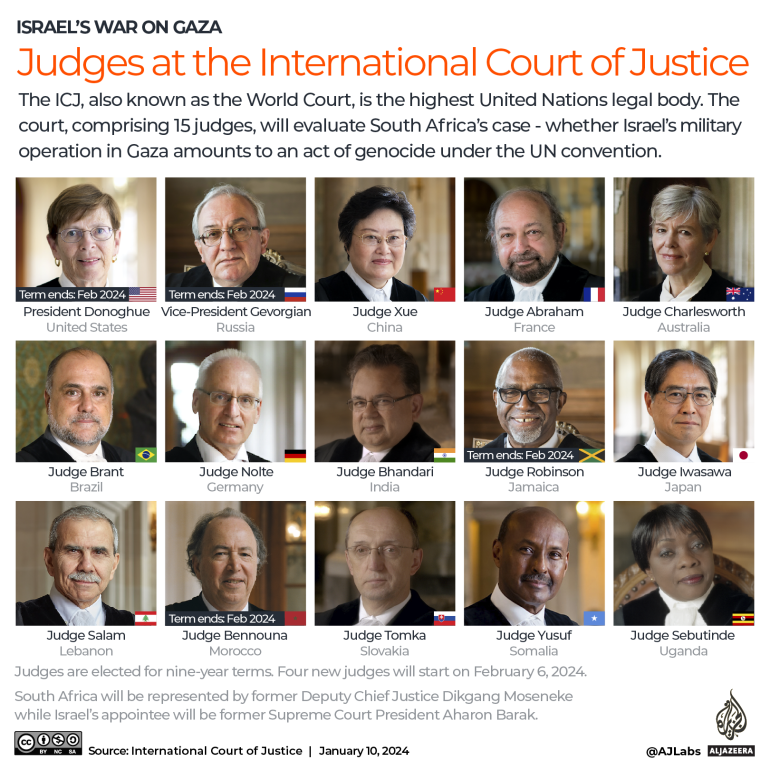
What happens if the ICJ orders no provisional measures?
Gordon said he believes the court will order some measures rather than none at all.
However, the ICJ can choose not to order interim measures. This would not mean the end of the legal case, however. The overall case for genocide will still be considered.
If provisional measures are not ordered, South Africa and the countries that have backed it in its complaint against Israel will have to try avenues for stopping violence other than international legal fora, since the ICJ is the highest world court and the supreme legal authority, Gordon explained. This could include taking the issue up with the UN Security Council or placing legal pressure on countries providing Israel with weapons.
Alternatively, if they believe the violence is persisting and escalating, another country, or even South Africa again, can file a new, separate case with the ICJ.
Could an ICJ ruling make any difference for Gaza?
The ICJ’s rulings are legally binding and cannot be appealed. However, the court has no way of enforcing them and the enforcement is left to the international community.
“Whether Israel takes the measures into account or not is a different story,” said Gordon.
“Israel cannot appeal the court’s ruling, and it will have to decide whether it abides by the court’s decision or not,” he added.
If it does not abide by the ruling, a member state of the UN Security Council (UNSC) can escalate this before the Council, which will then vote to require Israel to abide by the provisional measures.
The US could possibly cast a veto in this vote, a move the permanent member has repeatedly made in the past to obviate accountability for its close ally Israel.
However, Gordon pointed out that a resolution drafted by a Security Council member state might hold different weight compared with a decision made by the highest court in the world. If the US vetoes a Security Council resolution based on the ICJ decision “it will expose the duplicity of the US like no other veto before”.
In a scenario in which the US does not veto and the UNSC passes the resolution, it would have the power to take punitive action against Israel. Past examples of UNSC action have included economic or trade sanctions, arms embargoes and travel bans.
The UN charter also allows the Council to go a step further and intervene with force. An example of this happened in 1991 when a US-led military alliance was created to reverse the invasion of Kuwait by the Iraqi leader, Saddam Hussein.
An ICJ ruling on the provisional measures in Gaza could possibly be actionable, therefore. However, it would be up to the international community to enforce it. – AL JAZEERA
Stay informed with The Namibian – your source for credible journalism. Get in-depth reporting and opinions for
only N$85 a month. Invest in journalism, invest in democracy –
Subscribe Now!



